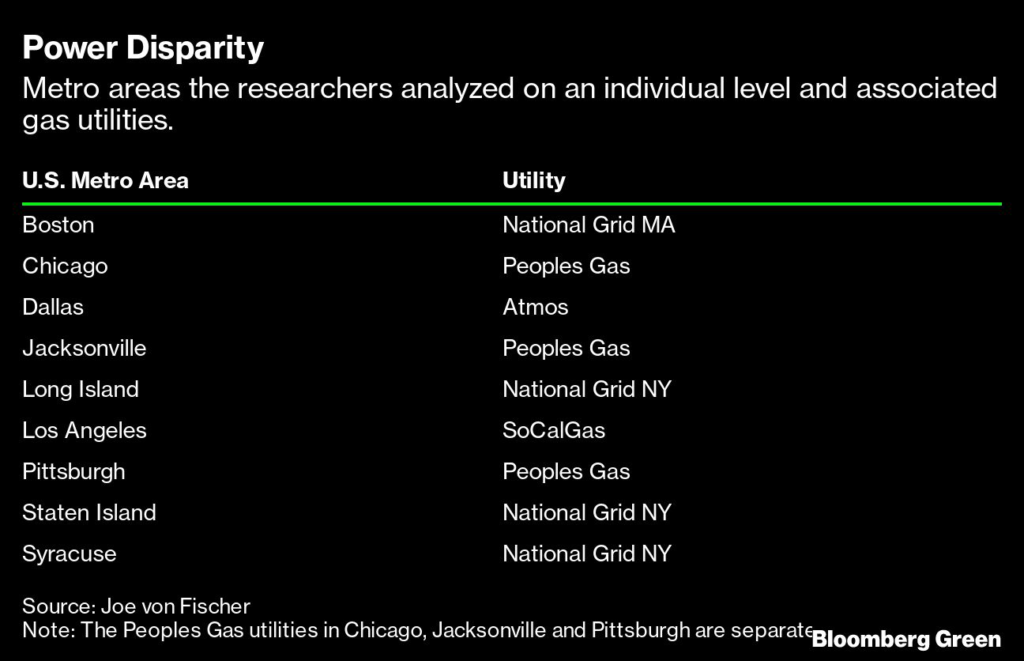(Bloomberg) — A new study found a greater density of dangerous leaks from gas pipelines in US urban areas where there’s a higher proportion of people of color, raising questions about the unequal distribution of risks that comes with using the highly combustible fuel for energy.
The researchers strapped devices onto Google Street View cars to detect leaks of methane — the main component of natural gas — and combined that information with census data to see if the releases correlated with factors such as race, income and English-language fluency. They found that, on average, across thirteen US urban metro areas, neighborhoods with higher percentages of minorities and lower earnings experienced a greater density of leaks.Older pipelines have a greater tendency to leak but many factors can contribute to infrastructure disparities including historical inequalities, lack of leak reporting by residents and insufficient regulation, the scientists wrote in a paper published Wednesday in Environmental Science & Technology. They relied on methane data collected between 2014 and 2018.“This data offers a way forward to address how public utilities are maintained and to ensure the services they offer are equitable,” said Joe von Fischer, one of the authors and a professor at Colorado State University. “It allows for transparency and public accountability.”The paper didn’t identify utilities that provide gas distribution services in the 13 metro areas studied; the authors provided the information separately. Four of the areas were excluded from individual analysis because there weren’t enough leaks detected, although the information gathered there was included in the overall study that covered areas home to 4.5 million people. In eight of the remaining nine metro areas, the authors estimated that leak density increased with a rise in the share of people of color, although the magnitude of the association and overall leaks per mile surveyed varied.
National Grid, which operates in four of the areas highlighted in the paper, said it uses “the same criteria for repair in all of our communities that we serve” and that it “continually upgrades the gas infrastructure based on our own commitment to safety and in coordination with federal and local state guidelines and regulations.”
Atmos Energy, which serves the Dallas region, didn’t respond to an email seeking comment about the academic report.
The study also found a strong correlation between the age of housing and leaks, and several utilities noted they have invested heavily in replacing old pipes.“We have been replacing rapidly corroding cast iron pipes that date back as far as the 1800s, literally the era of President Abraham Lincoln,” the Peoples Gas utility that serves Chicago said. The utility isn’t related to entities with the same name in Jacksonville and Pittsburgh. “We’re doing the work across all of Chicago, in every neighborhood, for the benefit of every person who lives and works here.”
Peoples Gas in Florida said it repaired 13 non-hazardous leaks in its gas system after a methane mapping survey was done in the Jacksonville area. The utility said that legacy pipes made from obsolete materials such as cast iron and bare steel are more prone to leaks, and since 2012 it’s replaced more than 600 miles of legacy pipes.
Utilities should prioritize repairs and replacement of infrastructure in marginalized communities when all other risks and costs are equal, the authors recommended. Advanced leak detection methods that use newer technologies can also reduce burden on the public, they said.Incidents in recent years have highlighted the risk of neglected pipelines. A 12-year old girl in Dallas was killed and four other people injured after a home gas leak in 2018 triggered an explosion, according to the Dallas Morning News. The same year explosions and fires rocked the cities of three cities in the Merrimack Valley in Massachusetts killing one person, burning more than 100 homes and displacing thousands, according to NBC Boston.
More stories like this are available on bloomberg.com
©2022 Bloomberg L.P.











